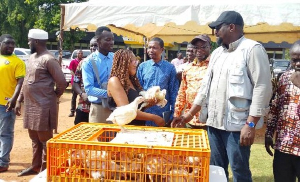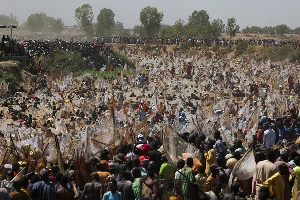Ghana is now as a major supplier of child slaves in child trafficking in the West Africa sub region. Internal routes for the illicit trade include Tamale, Bolgatanga, Wa, Ningo, Ada, Adidome and Winneba.
Sunyani, Accra, Takoradi, Afram Plains and some towns along the Volta Lake including Dzemeni and Kpando-Torkor are the prominent receiving points identified. Outside the shores of the country, the children are sold in Togo, La Cote d'Ivoire and Burkina Faso.
Mr Wilbert Tengey, Executive Director of the African Centre for Human Development, made the revelations on Thursday in Accra, in a report on study on child trafficking in Ghana, at the launching of a national programme on combating the trafficking in children for labour exploitation in Ghana.
The two-phase project being implemented by the International Labour Organisation (ILO) in partnership with the Ministry of Manpower Development and Employment (MMDE), United Nations Development Programme, Ghana Employers' Association, the Ghana Trades Union Congress and other organisations meant to address the rising problem of child trafficking, would focus on prevention through advocacy, awareness creation and community mobilisation programmes.
It would also build the capacity of legal and security agencies, government ministries, non-governmental organisations, employers and workers organisations and sensitise the media, civil society organisations and religious bodies to respond to the problem of child trafficking and expose child trafficking syndicates with the help of the security agencies.
Phase one would focus on building partnerships and creating awareness while phase two would focus on withdrawal of sold children, rehabilitate and mainstream them into formal and non- formal school systems.
The target is to rescue 2,500 children over a two-year period, and priority would be given to the youngest children and girls, especially those working in extremely hazardous conditions.
The extremely hazardous conditions include working in the mines, quarries, plantations, child fishermen, prostitutes and drug pushers as all these expose the child to physical, psychological, social and spiritual harm.
Mrs Cecilia Bannerman, Minister for Manpower Development and Employment, said the sector Ministry was about to obtain 2.3 million dollars from the World Bank to help street and other working children.
She gave the assurance that with the present programme to combat trafficking of children for labour exploitation, the Ministry was joining hands with the Women and Children's Ministry, other relevant ministries, the ILO/IPEC and development partners to eliminate the illicit trade.
Vice President Aliu Mahama launched the programme and inaugurated an 18 member Task Force headed by Mr Ben C. Eghan, Chief Director of the Ministry of Manpower Development and Employment.
He urged the security agencies to arrest child traffickers and deal with them according to the law. "Child trafficking is never in the interest of the child's well-being and is an affront to the national motto of 'Freedom and Justice.'
"Their circumstance does not justify the abuse meted out to them." He said the government was committed to providing for both children in and out of school and would implement programmes that would give all children access to basic education and employable skills. "This will encourage our children to go to school when they should, rather than engaging in child labour."
Alhaji Mahama noted that Ghana was the first country to have signed the Convention on the Rights of the Child. It has also ratified ILO Convention 182 on the Elimination of the Worst Forms of Child Labour. "We should act now to assure our children that we are committed to our promises.
"It is time for us all to act now to ensure that things that unite us as family members are not sacrificed on the altar of a few selfish individuals." Mrs Gladys Asmah, Minister for Women and Children's Affairs, identified recruiters, intermediaries, transporters, distributors and employers within the child trafficking syndicate as the key players. She said child trafficking interferes with the country's efforts to participate in the global economy.
General News of Friday, 8 March 2002
Source: gna












